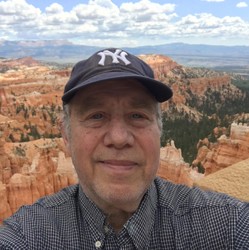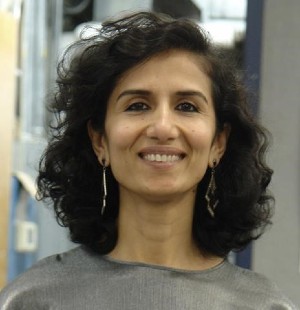PROF. DAVID SOKOLOFF, University of Oregon

Title: Exploring Multimedia to Adapt Interactive Lecture Demonstrations (ILDs) for Home Use
Abstract:
With the need for distance learning materials thrust upon us alarmingly and suddenly, it is not unreasonable that many have fallen back on passive presentation of lectures and black/whiteboard notes using some mode of video conferencing. But is it possible to maintain some element of active learning for our introductory physics students? I will describe my attempts to use the wealth of multimedia materials currently available (videos, simulations, photos, computer-based laboratory graphs, etc.) to adapt Interactive Lecture Demonstrations (ILDs) (1), (2), (3) to a form that can be used by students at home (4). While recognizing that small-group discussions--and sharing in any way--may be difficult for many, these Home Adapted ILDs retain student predictions as an essential element in engaging students in the learning process. This talk will review the design features of ILDs, describe some of the multimedia resources that are freely available, and present some examples of Home Adapted ILDs. As we enter an uncertain future, this approach could have important applicability for pre-service and in-service teacher preparation programs, as well as for undergraduate physics students.
(1) David R. Sokoloff and Ronald K. Thornton, “Using Interactive Lecture Demonstrations to Create an Active Learning Environment,” Phys. Teach. 35: 6, 340 (1997).
(2) David R. Sokoloff and Ronald K. Thornton, Interactive Lecture Demonstrations (Hoboken, NJ, John Wiley and Sons, 2004).
(3) David R. Sokoloff, “Active Learning of Introductory Light and Optics,” Phys. Teach. 54: 1, 18 (2016).
(4) https://pages.uoregon.edu/sokoloff/HomeAdaptedILDs.html
Biography:
David Sokoloff is Professor of Physics, Emeritus at the University of Oregon. He earned his B.A. at Queens College of the City University of New York and his Ph.D. in AMO Physics at the Massachusetts Institute of Technology. For over three decades, he has studied students' conceptual understandings, and developed active learning approaches (with NSF and FIPSE support). These include Interactive Lecture Demonstrations (ILDs) and the four modules of RealTime Physics: Active Learning Laboratories (RTP), both published by Wiley and co-authored by Priscilla Laws and Ronald Thornton. His work has been published in the American Journal of Physics, the European Journal of Physics and The Physics Teacher. He has conducted numerous international and national workshops to disseminate these active learning approaches to secondary and university faculty. Since 2004, he has been part of the UNESCO Active Learning in Optics and Photonics (ALOP) team, presenting workshops in more than 30 developing countries in Africa, Asia, Eurasia, and Latin America. He is contributor to and editor of the ALOP Training Manual. The ALOP Team was awarded the 2011 SPIE Educator Award. He was awarded the American Physical Society (APS) 2010 Excellence in Physics Education Award (with Priscilla Laws and Ronald Thornton) and the American Association of Physics Teachers (AAPT) 2007 Robert A. Millikan Medal and 2020 Hans Christian Oersted Medal. He has been a Fulbright Specialist in Argentina (2011) and Japan (2018), is currently a member of IUPAP Commission 14 (International Commission on Physics Education), and served in AAPT’s Presidential Chain 2009-2012.
PROF. CHANDRALEKHA SINGH, University of Pittsburgh

Title: Using research-validated learning tools to help students with the conceptual knots and learning difficulties in quantum mechanics
Abstract:
Learning quantum mechanics is challenging. To help improve student understanding of quantum mechanics concepts, we have been conducting investigation of the conceptual knots and difficulties that students have in learning quantum mechanics and we are using research as a guide to develop Quantum Interactive Learning Tutorials (QuILTs) as well as tools for peer-instruction. The goal of QuILTs and peer-instruction tools is to actively engage students in the learning process and to help them build links between the formalism and the conceptual aspects of quantum physics. These learning tools focus on helping students integrate qualitative and quantitative understanding without compromising technical content. In this talk, I will discuss a framework for understanding students' conceptual knots and learning difficulties in quantum mechanics and give examples of how research-validated learning tools and pedagogies can help students develop a good grasp of quantum mechanics. We thank the US National Science Foundation for support.
Biography:
Chandralekha Singh is a professor in the Department of Physics and Astronomy and the Founding Director of the Discipline-based Science Education Research Center (dB-SERC) at the University of Pittsburgh. She is currently the President of the American Association of Physics Teachers. She obtained her bachelors and masters degrees from the Indian Institute of Technology Kharagpur and her Ph.D. in theoretical condensed matter physics from the University of California Santa Barbara. She was a postdoctoral fellow at the University of Illinois Urbana Champaign, before joining the University of Pittsburgh. She has been conducting research in physics education for more than two decades. She co-led the US team to the International Conference on Women in Physics in Birmingham UK in 2017. She is a Fellow of the American Physical Society, American Association for the Advancement of Science and American Association of Physics Teacher. More information about her can be found at https://sites.google.com/site/professorsinghswebpage/

